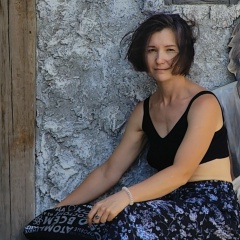Что ж, вот вам про книжку моё мнение без спойлеров.
Вкратце: это кайф. И easy-reading. Никакой фантастики, почти журналистика.
Витёк, как в лучшие времена, совместил некие основы духовного знания/опыта и актуальную современность. Только духовное знание ныне не настолько "сакральное", как было, например, про халдеев в "Generation P" или про пса Пиздеца в "А Хули" и без таких аллюзий, как в "Жизни насекомых". Тут проще всё. Реальные основы буддизма, реальные переживания ступеней духовного опыта и очень тонкая передача ощущений от практик - я до сих пор уверен, что Виктор Олегович бывал там, а не срисовывает с чужих описаний переживаний.
Актуальная современность тоже изображена по-простецки. Без залов поющих кариатид, обращений в волков и тайных заговоров казаков против ми-6. Это скорее "кавер" на старпёрский фильм "Верные друзья" 1954 года о путешествии трёх успешных мужчин на бревенчатом плоту по Яузе.
В чём фишка и отсутствие нудятины, что почти всегда удаётся автору: допустим, даже и имея глубокий духовный опыт, он не учит нас, как церковный батюшка, а рисует такие гротески и арабески, что с одной стороны, "sapienti sat", с другой - "не шаришь - хоть поржёшь". Или начнёшь искать.
В общем, книга рекомендуется лицам с 15-летнего возраста, склонным к духовным исканиям, опосредованным от ритуала. По большей части буддийского толка и дзен.
Ну да, чуть не забыл - есть всё же некая линия, сильно мистифицирующая некое социальное явление. Но это доведено до такого абсурда (как обычно), что сомнений в стёбе не остаётся)
????
Вкратце: это кайф. И easy-reading. Никакой фантастики, почти журналистика.
Витёк, как в лучшие времена, совместил некие основы духовного знания/опыта и актуальную современность. Только духовное знание ныне не настолько "сакральное", как было, например, про халдеев в "Generation P" или про пса Пиздеца в "А Хули" и без таких аллюзий, как в "Жизни насекомых". Тут проще всё. Реальные основы буддизма, реальные переживания ступеней духовного опыта и очень тонкая передача ощущений от практик - я до сих пор уверен, что Виктор Олегович бывал там, а не срисовывает с чужих описаний переживаний.
Актуальная современность тоже изображена по-простецки. Без залов поющих кариатид, обращений в волков и тайных заговоров казаков против ми-6. Это скорее "кавер" на старпёрский фильм "Верные друзья" 1954 года о путешествии трёх успешных мужчин на бревенчатом плоту по Яузе.
В чём фишка и отсутствие нудятины, что почти всегда удаётся автору: допустим, даже и имея глубокий духовный опыт, он не учит нас, как церковный батюшка, а рисует такие гротески и арабески, что с одной стороны, "sapienti sat", с другой - "не шаришь - хоть поржёшь". Или начнёшь искать.
В общем, книга рекомендуется лицам с 15-летнего возраста, склонным к духовным исканиям, опосредованным от ритуала. По большей части буддийского толка и дзен.
Ну да, чуть не забыл - есть всё же некая линия, сильно мистифицирующая некое социальное явление. Но это доведено до такого абсурда (как обычно), что сомнений в стёбе не остаётся)
????
Well, here's a book about my opinion without spoilers.
In short: it's high. And easy-reading. No fiction, almost journalism.
Vitek, as in the best of times, combined some foundations of spiritual knowledge / experience and actual modernity. Only spiritual knowledge is now not so “sacred” as it was, for example, about the Chaldeans in “Generation P” or about the dog Pizdets in “A Hooley” and without such allusions as in “Life of insects”. Everything is simpler here. The real foundations of Buddhism, the real experiences of the stages of spiritual experience and the very subtle transfer of sensations from practices - I am still convinced that Viktor Olegovich was there, and does not draw from other people's descriptions of experiences.
Actual modernity is also depicted in a simple way. Without halls of singing caryatids, appeals to wolves and secret conspiracies of Cossacks against Mi-6. Rather, it is a cover for the old-time film 1951 “Faithful Friends” about the journey of three successful men on a log raft in Yauza.
What is the trick and lack of tediousness, which the author almost always succeeds in: let’s say, even having deep spiritual experience, he doesn’t teach us how to church priest, but draws such grotesques and arabesques that, on the one hand, “sapienti sat”, on the other - "Do not rummage - at least you’re laughing." Or start looking.
In general, the book is recommended for people from the age of 15 who are prone to spiritual quests mediated from the ritual. Mostly Buddhist and Zen.
Well, yes, I almost forgot - there is still a certain line that greatly mystifies a certain social phenomenon. But this is brought to such an absurdity (as usual) that there is no doubt about the banter)
????
In short: it's high. And easy-reading. No fiction, almost journalism.
Vitek, as in the best of times, combined some foundations of spiritual knowledge / experience and actual modernity. Only spiritual knowledge is now not so “sacred” as it was, for example, about the Chaldeans in “Generation P” or about the dog Pizdets in “A Hooley” and without such allusions as in “Life of insects”. Everything is simpler here. The real foundations of Buddhism, the real experiences of the stages of spiritual experience and the very subtle transfer of sensations from practices - I am still convinced that Viktor Olegovich was there, and does not draw from other people's descriptions of experiences.
Actual modernity is also depicted in a simple way. Without halls of singing caryatids, appeals to wolves and secret conspiracies of Cossacks against Mi-6. Rather, it is a cover for the old-time film 1951 “Faithful Friends” about the journey of three successful men on a log raft in Yauza.
What is the trick and lack of tediousness, which the author almost always succeeds in: let’s say, even having deep spiritual experience, he doesn’t teach us how to church priest, but draws such grotesques and arabesques that, on the one hand, “sapienti sat”, on the other - "Do not rummage - at least you’re laughing." Or start looking.
In general, the book is recommended for people from the age of 15 who are prone to spiritual quests mediated from the ritual. Mostly Buddhist and Zen.
Well, yes, I almost forgot - there is still a certain line that greatly mystifies a certain social phenomenon. But this is brought to such an absurdity (as usual) that there is no doubt about the banter)
????

У записи 3 лайков,
0 репостов,
391 просмотров.
0 репостов,
391 просмотров.
Эту запись оставил(а) на своей стене Михаил Рощин
























